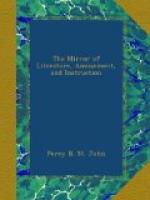* * * * *
HARDHAM’S 37
Snuff-takers generally, especially the patrons of Hardham’s 37 will read the following record of benevolence with some gratification:—“In 1772, Mr. John Hardham, a tobacconist, in London, a native of Chichester, left by his will the interest of all his estates to the guardians of the poor, ’to ease the inhabitants in their poor-rates for ever.’ This valuable legacy amounting to 653_l._ per annum was subject to the life of the housekeeper of the testator, so that it was not till 1786 that it reverted to the city.”—This is even better than the plan for snuff-takers paying off the national debt.
* * * * *
PRESTON, LANCASTER.
Preston is a market-town, borough, and parish; situated on the river Ribble, in the hundred of Amounderness, county palatine of Lancaster. It was incorporated by Henry II., in 1160; and the privileges and free customs granted by this and subsequent royal grants were confirmed by Charter of 36th Charles II. The body corporate consists of a mayor, recorder, seven aldermen, and seventeen capital burgesses, who, together, form the common council of the borough. The mayor, two town-bailiffs, and two sergeants are elected annually, upon the Friday preceding the festival of St. Wilfrid, who was formerly lord of this town; and they are invested, on the 12th of October following, by a jury of twenty-four guild burgesses. The members of the council, with the exception of the mayor, retain their seats for life, or during the pleasure of a majority, and vacancies are supplied by the remaining members. The town sends two representatives to parliament, and affords the nearest practical example of universal suffrage in the kingdom—every male inhabitant, whether housekeeper or lodger, who has resided six months in the town, and who has not, during the last twelve months, been chargeable to any township as a pauper, having a right to vote for two candidates at elections. This principle was established by a decision of the House of Commons, on an appeal, in the year 1766, and has ever since been acted upon. The burgesses are entitled, by the charter of Henry II., to have a GUILD MERCHANT, with the usual franchises annexed, of safe transit through the kingdom, exemption from toll, pontage, and stallage; liberty to buy and sell peaceably; and power to hold a guild for the renewal of freedom to the burgesses, the confirming of by-laws, and other purposes. This privilege is still made the occasion of great festivity. For a long time after their first institution, the guilds were held at irregular periods, but they have now, for more than a century, been uniformly celebrated every twentieth year, commencing on the Monday next after the Decollation of St. John, which generally happens in the last week of August; the last was held in 1822, and commenced on the 22nd




